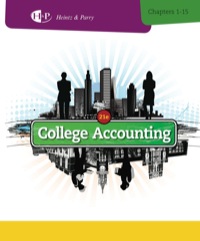Question
Analyzing and Distributing Cash Dividends to Preferred and Common Stocks Potter Company has outstanding 16,000 shares of $60 par value, 5% preferred stock and 60,000
Analyzing and Distributing Cash Dividends to Preferred and Common Stocks Potter Company has outstanding 16,000 shares of $60 par value, 5% preferred stock and 60,000 shares of $5 par value common stock. During its first three years in business, it declared and paid no cash dividends in the first year, $260,000 in the second year, and $48,000 in the third year.
a. If the preferred stock is cumulative, determine the total amount of cash dividends paid to each class of stock in each of the three years.
| Distribution to | ||
|---|---|---|
| Preferred | Common | |
| Year 1 | Answer | Answer |
| Year 2 | Answer | Answer |
| Year 3 | Answer | Answer |
b. If the preferred stock is noncumulative, determine the total amount of cash dividends paid to each class of stock in each of the three years.
| Distribution to | ||
|---|---|---|
| Preferred | Common | |
| Year 1 | Answer | Answer |
| Year 2 | Answer | Answer |
| Year 3 | Answer | Answer |
c. How should each type of preferred dividends be treated in calculating EPS?
Basic EPS would be increased in Years 2 and 3 when the preferred dividends are added from net income in the numerator.
Basic EPS would be reduced in Years 2 and 3 when the preferred dividends are added to the number of shares in the denominator.
Basic EPS would be reduced in Years 2 and 3 when the preferred dividends are subtracted from net income in the numerator.
Basic EPS would be increased in Years 2 and 3 when the preferred dividends are subtracted from the number of shares in the denominator.
Step by Step Solution
There are 3 Steps involved in it
Step: 1

Get Instant Access to Expert-Tailored Solutions
See step-by-step solutions with expert insights and AI powered tools for academic success
Step: 2

Step: 3

Ace Your Homework with AI
Get the answers you need in no time with our AI-driven, step-by-step assistance
Get Started


